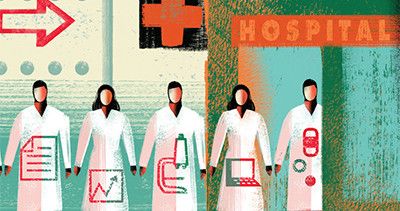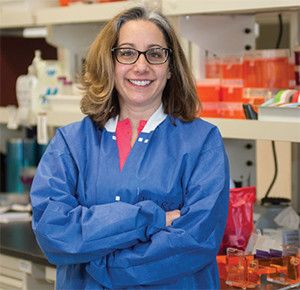Brent Etiz, a Stanford graduate and former Silicon Valley techie, was in need of a change. “I had this period of enlightenment,” he says, “where I thought ‘I really want to go back and try [becoming a doctor],’ so I started scouring the country for programs that offered all of the premedical requirements.”The George Washington University (GW) School of Medicine and Health Sciences (SMHS) Post-Baccalaureate Pre-Medicine program fit the bill.

The program, designed to prepare college graduates with the prerequisites for admission, has long attracted highfliers like Etiz, successfully guiding them into medical school. Likewise, another SMHS program, Medical Laboratory Sciences (MLS) — a combination of blended (a mixture of online and bricks-and-mortar courses) and graduate programs — has drawn ambitious students interested in ascending to the next step in their career.
“I love the program,” says Brandy Holzman, an MLS student. After riding in a hunter/jumper horse show circuit until she was 28, Holzman felt she “needed to find a career that doesn’t involve horses.” Tired of traveling and suffering from back pain, she began working in an animal hospital, with an eye toward shifting to the human side of health care. “I felt too old [for medical school], so this [program] was a nice balance; I can be well-rounded and help with the diagnostic work and still talk to doctors. It seemed like a good fit for me.”
With the success of the MLS and Post-Baccalaureate Pre-Medicine programs — both of which fell under the Clinical Research and Leadership umbrella within Health Sciences — came expansion. When GW started to build out the Virginia Science and Technology Campus (VSTC) in Ashburn, Virginia, an opportunity presented itself: The two programs were shuffled under the newly established Department of Integrated Health Sciences, led by interim chair Marcia Firmani, Ph.D., M.S.P.H., and relocated to the VSTC.

“We’re able to have dedicated staff at the VSTC to advise on these programs and have people doing outreach specifically for these programs,” says Firmani, who also serves as director of the MLS blended bachelor of science in health sciences (B.S.H.S.) and graduate programs and as assistant professor of integrated health sciences at SMHS. “For everyone in the department, their home is at VSTC. The benefit is, we now have that common ground that provides better opportunities to work together to expand the existing programs while building new programs.”
The new department also includes distance-learning opportunities — a fully online B.S.H.S. with a major in MLS for medical lab technicians, five certificate programs, five graduate programs, and numerous military-affiliated programs — and future educational possibilities.
“We’re in the process of developing dual-degree programs, and we are in the planning stages of a potential doctoral degree program to expand upon our current career pathway options at VSTC,” Firmani says. “There are a lot of opportunities for growth, teamwork, and spearheading new endeavors, which is an exciting movement to be involved in.”
Holzman says that having access to the VSTC campus for her program, which blends online coursework with on-site lab training, has been ideal. “I was scared at first, because I’ve never done online courses, but it’s worked out well,” she says. “Having a lab in Ashburn is great because I still have that contact between professor and student.”
Kenia Gomez, who’s in her last semester in the blended MLS program, has also found that the class structure suits her needs. “What I like about the program is that the laboratory class covers the same material being taught online,” she explains. “[It] helps me understand the course material and the science behind it more.” Etiz, when he’s not preparing for the MCAT with his cohort, has also taken advantage of what the VSTC offers. “Because there’s the MLS program, there’s also a research laboratory out of the Virginia campus, so I had the opportunity to assist in research with Dr. Marcia Firmani,” he says. “To be able to have those opportunities while also completing my didactic work … ultimately made coming to GW a very easy and intuitive decision.”



